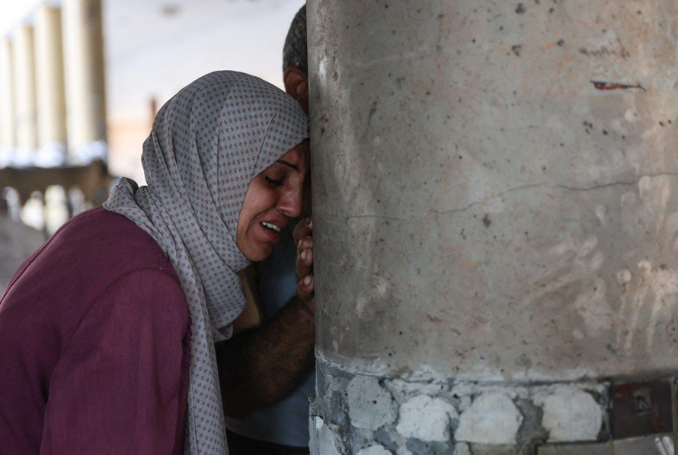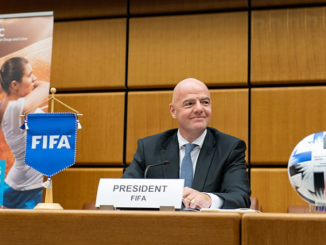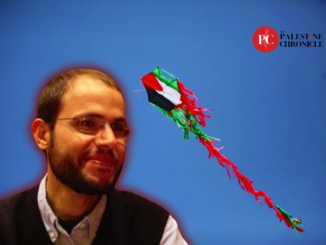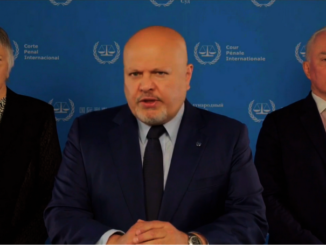
By Palestine Chronicle Editors
If one is to review the timeline of essentially all rounds of ceasefire negotiations, one would find that every single episode has always been preceded by a major massacre, or two, or three.
United Nations Special Rapporteur on the situation of human rights in the Palestinian Territory, Francesca Albanese, twitted the following lines on Saturday:
“Israel is genociding the Palestinians, one neighborhood at the time, one hospital at the time, one school at the time, one refugee camp at the time, one ‘safe zone’ at the time. With US and European weapons. And amid the indifference of all ‘civilised nations’.
Albanese’s statement was a direct response to the latest Israeli massacre of over 100 Palestinian civilians in Gaza, who were displaced at the Tabaeen School in the Al-Daraj neighborhood in Gaza City.
Gaza: In the largest and most shameful concentration camp of the 21st century, Israel is genociding the Palestinians one neighborhood at the time, one hospital at the time, one school at the time, one refugee camp at the time, one 'safe zone' at the time. With US and European… https://t.co/bHmrFbySYi
— Francesca Albanese, UN Special Rapporteur oPt (@FranceskAlbs) August 10, 2024
According to the Gaza Civil Defense, Israel has struck 13 schools in August alone.
Israel’s ready-to-serve explanation of why it targets Palestinian civilians with such brutality is that it may have spotted a militant or two among the crowd. There has been little or no evidence of such claims.
At times, Israel would skip the explanation altogether, and international media, especially corporate Western media, is no longer interested in explanations anyway
But Palestinians, and even some Israelis, have become familiar with the trend. They know full well the inhumane logic behind Israel’s massacres.
In its live blog coverage of the ongoing Israeli genocide in the Gaza Strip, Al-Jazeera cited the father of one of the Israeli captives in Gaza as saying that Israeli Prime Minister Benjamin Netanyahu carries out massacres to thwart any possible ceasefire agreement between the Israeli military and the Palestinian Resistance.
According to the unnamed father, this is done to satisfy two ‘blood-thirsty Israeli ministers’, namely Israel’s National Security Minister Itamar Ben-Gvir and Finance Minister Bezalel Smotrich.
The above conclusion should be obvious to anyone who cares to decipher the news beyond Western media propaganda and the well-documented lies of the Israeli military.
In fact, if one is to review the timeline of essentially all rounds of ceasefire negotiations, one would find that every single episode has always been preceded by a major massacre, or two, or three.
This begs the question, why are Palestinians allowing Israel to sell the phony idea that it is interested in a ceasefire while killing thousands of innocent Palestinians in the process?
The answer could lie in a single word: pressure, specifically the kind of pressure emanating from Arab countries that play the role of the mediators, namely Qatar and Egypt. Western media has long documented that such pressure exists, although Hamas, possibly for diplomatic reasons, denied the authenticity of these reports.
But the existence of such pressure is obvious. In a statement published on Friday, the United States, Egypt and Qatar called to “release the hostages, begin the cease-fire, and implement this agreement”
“There is no further time to waste nor excuses from any party for further delay,” the statement added.
More than 100 people were killed and dozens injured when the Israeli occupation forces targeted a school in the center of Gaza City.
Israel bombed the displaced Palestinians while they were performing the dawn prayer, according to the Gaza Government Media office.
The Civil… pic.twitter.com/ZWZD7uMW2r
— The Palestine Chronicle (@PalestineChron) August 10, 2024
The nonchalant nature of that statement gives the impression that the Palestinians are equally culpable for the delay in achieving a ceasefire deal. It equates between those massacring civilians and those fighting back. The logic is troubling.
The statement also neglects that Israel had, on July 31, assassinated the very chief negotiator of the Palestinian Resistance. Not only did the Israeli murder of Hamas’ political bureau chief Ismail Haniyeh in Tehran push the reset button on any ceasefire talks, but it has also pushed the whole region to the brink of a regional war.
Clearly, Israel is not in the mood to negotiate, let alone reach a ceasefire agreement, regardless of the degree of concessions on the part of the Palestinians.
The above is not only a rational conclusion based on Israel’s own behavior, but it is the declared position of Netanyahu and his government.
The absurdity of the so-called ceasefire talks reached a new height when Hamas accepted, on May 6, an Israeli ceasefire proposal, which was communicated by Washington itself, before Israel itself rejected the very ceasefire proposal it had formulated.
Palestinians must be aware of all of this. So again, why the return to negotiations?
Since the start of the war, Hamas has been operating politically on several fronts, including two major ones: one in Qatar, an American ally that hosts the top leaders of the movement, and the other in Egypt.
Egypt, in particular, is strategically important for Palestinians since Israel’s initial goal of its war on Gaza was to ethnically cleanse Palestinians from the Strip to the Sinai desert.
Cairo has vehemently and repeatedly rejected the Israeli plot. The Egyptian government and military also continue to reject Israel’s control over the Philadelphi Corridor and the Rafah Crossing, although Cairo has done little to challenge Israel’s continued aggressions in the border region.
It is possible that Hamas is forced to play the ceasefire talks game to pacify both Doha and Cairo – though Palestinians have already reached the conclusion that no positive outcome is possible when Netanyahu continues to kill civilians in order to preclude any positive outcome of the talks.
This logic might change, however. The assassination of Haniyeh has led to the surprising move of the election of the Gaza-based Yahya Sinwar as Hamas’ new top leader.
This means that the political-military dichotomy of Hamas has been largely resolved, as the military leaders of the movement are also the ones making the political and strategic decisions.
Sinwar, though well-known for his military prowess, is also equally politically and strategically savvy. He understands Netanyahu’s ultimate goal from the sham ceasefire talks and is likely prepared to counter with a plan of his own.
The question remains, however, whether Hamas is now able to operate politically in a freer environment.
The current environment is one where the United States has indirect leverage over the Palestinians by translating its power over Arab states, such as Qatar and Egypt, into political capital.
If the Palestinians are able to deny Washington that kind of leverage, it would surely be able to make its own decision without arm-twisting, Arab pressure and the like.
Time will tell.
(The Palestine Chronicle)







